Conference “AI, Science & Society”
École Polytechnique, Palaiseau
École Polytechnique, Palaiseau
Registration is open!

l’École Normale Supérieure – PSL, 45, Rue d’Ulm, 75005 Paris
Programme and more information are available here.
Salle Dussane, 45 rue d’Ulm, 75005 Paris
The École normale supérieure and Google are pleased to invite you to a lecture by Prabhakar Raghavan
Senior Vice-President, Knowledge & Information on the theme:
‘Search engines and society: information quality and articial intelligence’
Prabhakar Raghavan is one of Google’s leading executives and technologists. Having moved from the laboratory to the operational reality of running a search engine, Prabhakar will discuss the crucial issues facing search engines in terms of research, public policy and society, focusing on information quality and the potential of AI. His speech will be followed by a discussion with Isabelle Ryl, President of PRAIRIE.
The event will be held in English, a translation system will be available in the room.
Prabhakar is responsible for Google’s Knowledge & Information products globally. He and his team of technologists and engineers around the world run the Google products that most commonly come to mind, including Google Search, Gemini, News, Maps, Advertising, Assistant, Commerce and Payments. Prabhakar is a leading technologist and brings over 20 years of experience in research on algorithms, web search, and databases. He has published over 100 papers, issued 20 patents, and written 2 graduate textbooks. He’s a member of the U.S. National Academy of Engineering, a Fellow of the Association of Computing Machinery, and IEEE, and was a Consulting Professor of Computer Science at Stanford University (where he first met Google’s founders, Larry Page and Sergey Brin when they were students there).
Isabelle Ryl is a Professor of Computer Science and the co-founder and director of PRAIRIE (PaRis Articial Intelligence Research InstitutE) at Université PSL, one of the four Interdisciplinary Articial Intelligence Institutes recognized under the French national strategy.
Isabelle Ryl holds a Ph.D. in Computer Science from the University of Lille and has spent over 12 years at INRIA in various management roles. As an expert in innovation, particularly in articial intelligence, she has served on the French Innovation Council, an interministerial body responsible for dening the major directions and priorities of innovation policy. She is a Knight of the Legion of Honor. In March 2024, Isabelle Ryl was appointed Vice President for Articial Intelligence at Université PSL.
l’École Normale Supérieure – PSL, 29, Rue d’Ulm, 75005 Paris
More information on the website.
Registrations close on the 15th of January 2025!
L’Université Paris Dauphine-PSL
Dauphine Digital Days, 3e édition
les 18, 19, et 20 novembre 2024 « L’IA en action : regards pluridisciplinaires »
L’Université Paris Dauphine – PSL et ses partenaires l’Institut PR[AI]RIE et la French Tech Grand Paris vous invitent à la 3e édition du cycle de conférences dédié à l’intelligence artificielle et ses impacts sur la société.
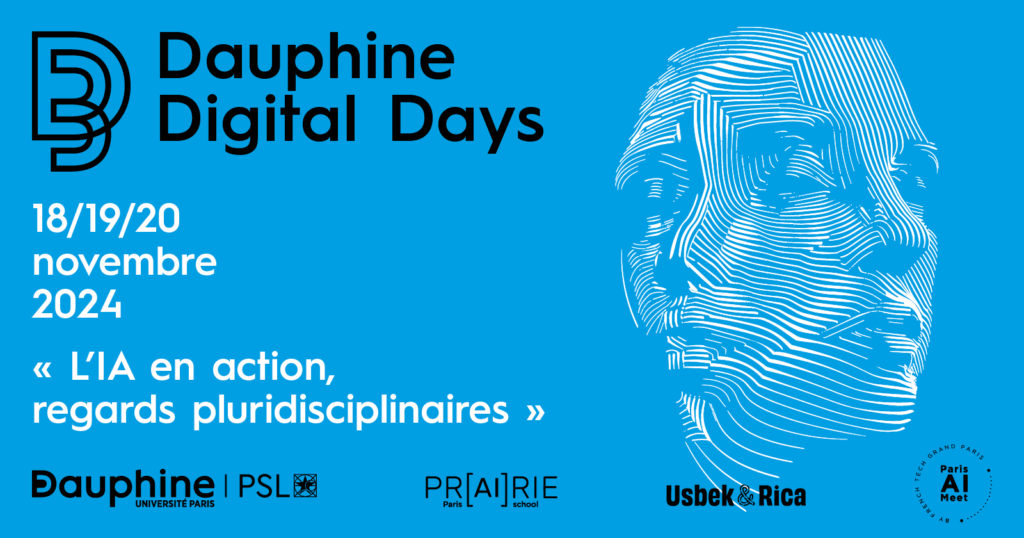
Station F
**** AGENDA ****
Doors open at 09:00 for registration and coffee.
General Track | Master Stage
Welcome Address
Laurent Solly, Vice President Southern Europe at Meta • Roxanne Varza, Director of Station F
Yann LeCun, VP & Chief AI Scientist at Meta • Thomas Wolf, Co-founder and CSO at Hugging Face • Patrick Perez, CEO at Kyutai . Moderated by Adrienne Jan, Chief Product Officer at Scaleway
Meta Llama 3: from Research to Applications
Joe Spisak, Product Director & Head of Generative AI Open Source at Meta • Lysandre Debut, Head of Open Source at Hugging Face.
Presented by DINUM (Direction Interministérielle du Numérique)
Startups & Open Source Research Demos
Lunch Break
DINOv2: From Research to Real Life Application
Camille Couprie, Research Scientist at Meta • Benjamin Lefaudeux, Head of Computer Vision & AI at PhotoRoom
How Openness Advances AI Safety
Jean-Marie John Mathews, Co-founder at Giskard AI • Guillaume Avrin, National coordinator for AI • Ania Kaci, Responsible AI Leader @ IBM France
Moderated by Pascale Fung, Senior Director of AI Research at Meta
Closing Remarks
Academic Track | Central Room
Code Llama a state-of-the-art large language model for coding
Fabian Gloeckle, PHD Student at Meta
AI Watermarking
Pierre Fernandez, PHD Student at Meta
Introducing SeamlessM4T
Marta R. Costa-Jussa, Research Scientist at Meta
Video Joint Embedding Predictive Architecture (V-JEPA)
Adrien Bardes, Research Scientist at Meta
Lunch Break
DINOv2: Learning Robust Visual Features Without Supervision
Timothée Darcet, PHD Student at Meta
What Matters Most When Building Vision-Language Models?
Leo Tronchon, ML Research Engineer at HuggingFace
The symposium will take place in two different venues, les Cordeliers (in Paris) and Télécom-Paris on the Plateau de Saclay (in the outskirts).
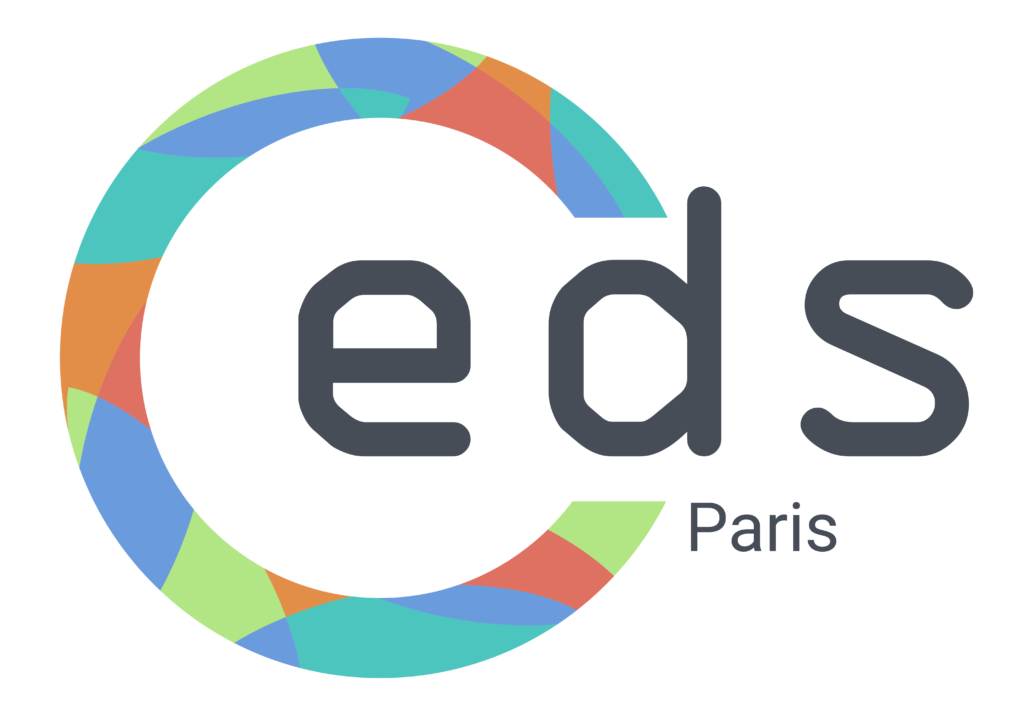
The ELLIS Doctoral Symposium is an annual conference for ELLIS PhD students and other PhD students to meet in person and share knowledge about machine learning. The ELLIS Doctoral Symposium 2024 (EDS2024) is the fourth edition, which is co-organised by the University of Amsterdam, ELSA and the Institut Polytechnique de Paris, and will be held in Paris, France. It is expected to host 150 attendees during one week from Monday, August 26 – to Friday, August 30.
The focus of this year’s symposium is AI & Sustainability.
Participants are expected to prepare a poster or a tooling session with a strong machine learning component. The topic of the poster or tooling session is completely open, as the ELLIS Programs bring together researchers from multiple disciplines within the machine learning community (Computer Vision, NLP, Theoretical ML, Reinforcement Learning, Human-Centric ML…). If upon registering you are unsure about the material you wish to present, do feel free to submit a tentative title. EDS2024 follows in the footsteps of the previous EDS iterations held in Helsinki (EDS2023), Alicante (EDS2022) and Tübingen (EDS2021). Save the date and join us for keynotes, poster & tooling sessions and social events in the beautiful City of Light!
Students requiring a short-stay visa for the event can apply here.

The European Laboratory for Learning and Intelligent Systems (ELLIS) is a pan-European AI network of excellence which focuses on fundamental science, technical innovation and societal impact. Founded in 2018, ELLIS builds upon machine learning as the driver for modern AI and aims to secure Europe’s sovereignty in this competitive field by creating a multi-centric AI research laboratory. ELLIS has established 43 units in 17 different countries in Europe. It has also launched the ELLIS PhD Program, one of Europe’s most competitive PhD programs which aims to foster and educate the best talent in machine learning and related research areas by pairing outstanding students with leading academic and industrial researchers across Europe. The ELLIS PhD Program has received funding from the European Union’s Horizon research and innovation programme under ELIAS Grant Agreement No. 101120237 (2023-2027) and from the Horizon Europe research and innovation programme under ELISE Grant Agreement No. 951847 (2020 – 2024) and ELSA Grant Agreement No. 101070617 (2022 – 2025).
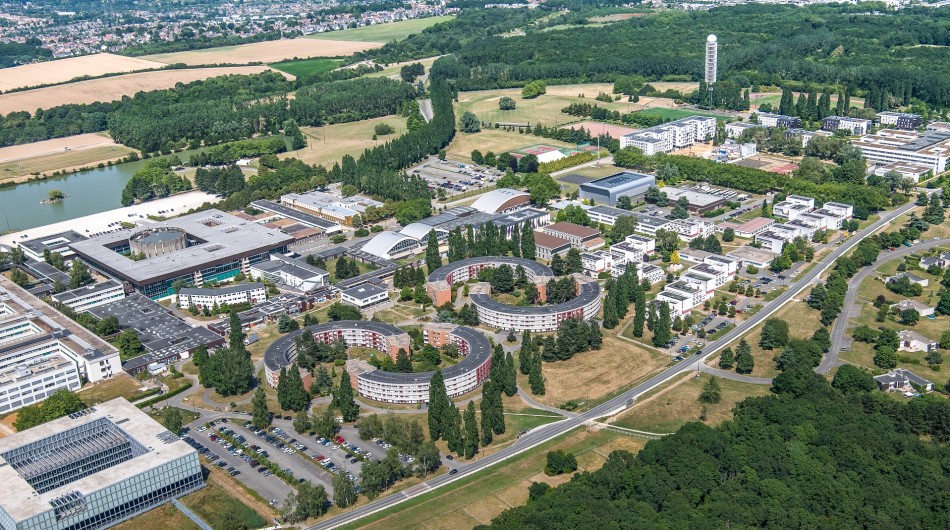
The Institut Polytechnique de Paris (IPP) is a world-class Institute of science and technology regrouping 5 prestigious French engineering Schools: École Polytechnique, ENSTA Paris, ENSAE Paris, Télécom Paris, Télécom SudParis. These schools have contributed to major industrial and technological breakthroughs over the last two centuries and use their respective expertise to develop competitive training programs and cutting-edge research. IPP has further established itself as a leader in education and research in France and internationally. Learn more on the website here!
Paris-Saclay University, France
Registration Information:
🔗 Registration is mandatory before 16 June 2024 for the first round.
🌐 Register here: https://lnkd.in/eEg4QM
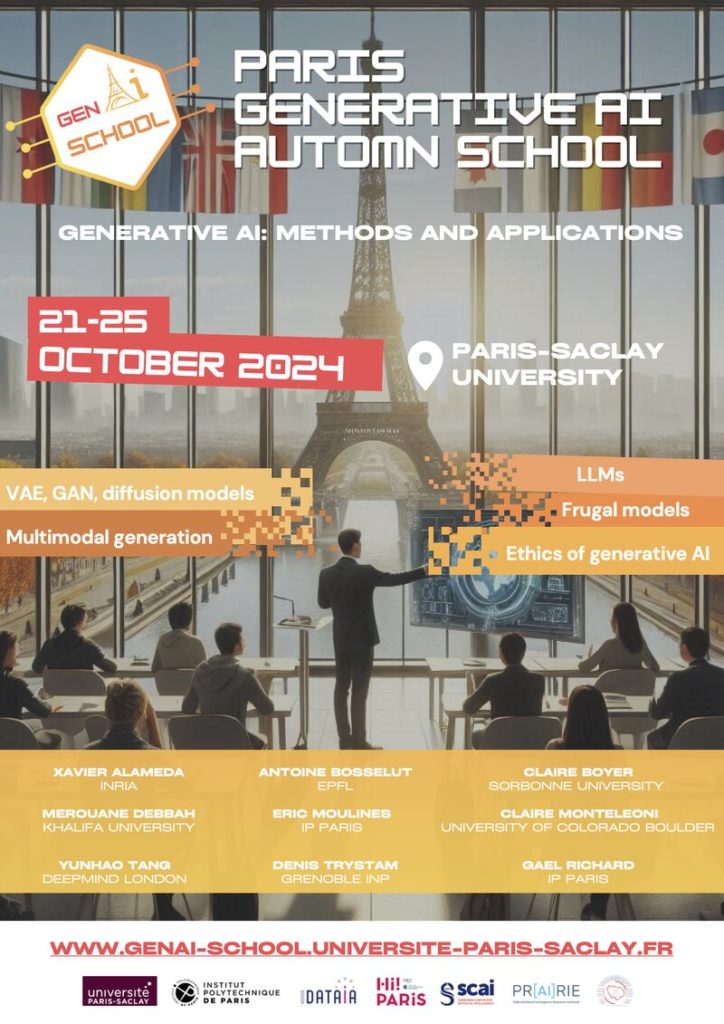
Coorganised by: Université Paris-Saclay and Institut Polytechnique de Paris
Under the auspices of: Université Paris-Saclay, Institut DATAIA, Institut Polytechnique de Paris,Hi! PARIS Center – AI for Science, Business & Society, SCAI Sorbonne Center for Artificial Intelligence, PRAIRIE Institute, DIM AI4IDF
ENSTA Paris on the campus of Institut Polytechnique de Paris in Palaiseau, France.
More information on how to get to ENSTA Paris.

The Hi! PARIS Symposium on Robotics, AI, and Society will take place on June 4-5, 2024, at ENSTA Paris in the Palaiseau/Saclay region of southern Greater Paris.
It includes plenary talks by worldwide renowned researchers, covering various aspects of Robotics, AI and related issues, an exhibition space, and networking opportunities.
>>> Registration is FREE and MANDATORY to ensure your place at this exclusive event. Please register at your earliest convenience using the following link: https://www.hi-paris.fr/symposium-registration/
(For reasons beyond our control, the social event initially planned for Tuesday evening had to be canceled. The scientific program is unchanged).
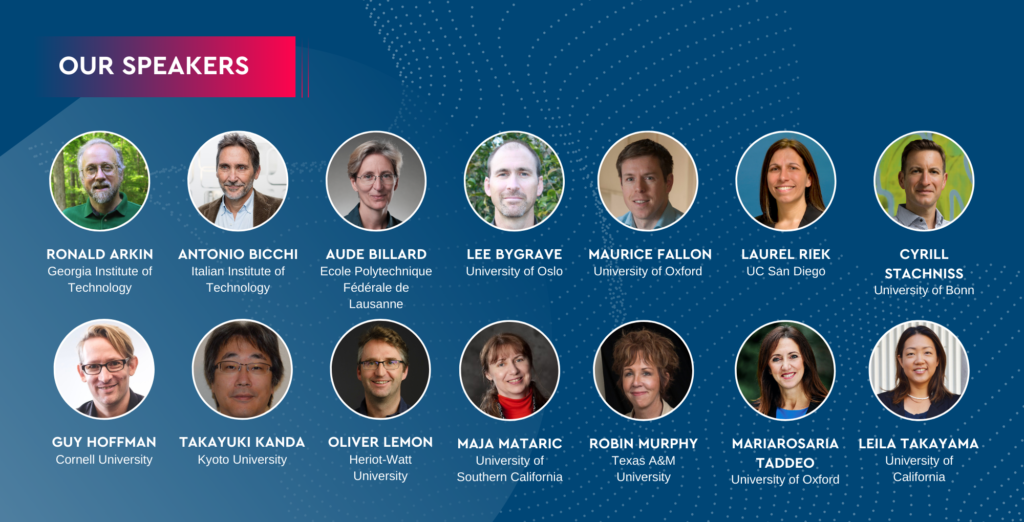
Speakers Include:
– Takayuki Kanda, Kyoto University: “Social robots in public space”
– Maja Mataric, University of Southern California
– Antonio Bicchi, Italian Institute of Technology: “Soft robotics technologies for prosthetics and rehabilitation”
– Laurel D. Riek, UC San Diego: “Cognitively assistive robots for people with mild cognitive impairment”
– Leila Takayama, UC Berkeley: “On designing robots to be invisible-in-use”
– Guy Hoffman, Cornell University: “Lifelike, futuristic, cute: cultural histories of robot design”
– Maurice Fallon, University of Oxford: “Robot mapping and navigation with learning and sensor fusion”
– Cyrill Stachniss, Rheinische Friedrich-Wilhelms-Universität Bonn: “Robotics and sensing for sustainable crop production”
– Lee A Bygrave, Universitetet i Oslo (UiO): “EU Regulation of Smart Robotics – Too Much, Too Soon?”
– Mariarosaria Taddeo, University of Oxford: “The ethics of artificial intelligence in national defence”
– Robin Murphy, Texas A&M University: “Robots, disasters, and AI for good”
– Ronald Arkin, Georgia Institute of Technology: “Lethal autonomous robots and the plight of the noncombatant”
– Oliver Lemon, University of Oxford: “Working together: building responsible generative AI for the future of Human-Robot Teams”
– Aude Billard, Ecole Polytechnique Fédérale de Lausanne
For more information, please visit the symposium webpage: https://www.hi-paris.fr/symposium-2024/
Scientific Committee:
François Goulette, Adriana Tapus, David Filliat, Philippe Xu, Elena Vanneaux and Nicolas Vieille.
We look forward to welcoming you to what promises to be an enlightening and engaging event.
The Hi! PARIS Symposium on AI and Society is a series of scientific conferences exploring the intersection of AI/Data Science and social sciences, on various fields. This second edition focuses on Robotics, AI, and Society. The Symposium registration rates are reduced thanks to the financial grants of Hi! PARIS corporate donors.
Salle Raymond Aron, Dauphine – PSL – Pl. du Maréchal de Lattre de Tassigny, 75016 Paris
Program Doctoral conference AI for science
Le programme DATA de l’Université PSL, en collaboration avec PR[AI]RIE, lance la première conférence doctorale PSL : l’IA pour les Sciences. L’objectif de cette conférence est de réunir des doctorants travaillant à l’interface des technologies de l’IA et de leur propre discipline (physique, biologie, sciences cognitives, économie, etc.), ou dans le domaine de l’IA fondamentale en vue d’applications.
Il sera organisé autour de quatre sessions d’une demi-journée, chacune d’entre elles étant ouverte par un chercheur de renommée internationale, suivies de brefs exposés (20 min + questions). Il y aura des sessions de posters présentés par des doctorants de PSL ainsi qu’un événement social organisé dans la soirée du 15 mai.
Institute of Intelligent Systems and Robotics (ISIR)
Sorbonne University, CNRS, INSERM
Physics Aware Deep Learning
Paris Institute of Astrophysics
Sorbonne University, CNRS
Bayesian deep learning for cosmology and gravitational waves
Laboratory of Biophysics and Evolution
ESPCI Paris – PSL, CNRS
Generating self-reproducing RNAs
Decision Support Systems Analysis and Modeling Laboratory
Dauphine – PSL, CNRS
From AI to Computational Social Choice
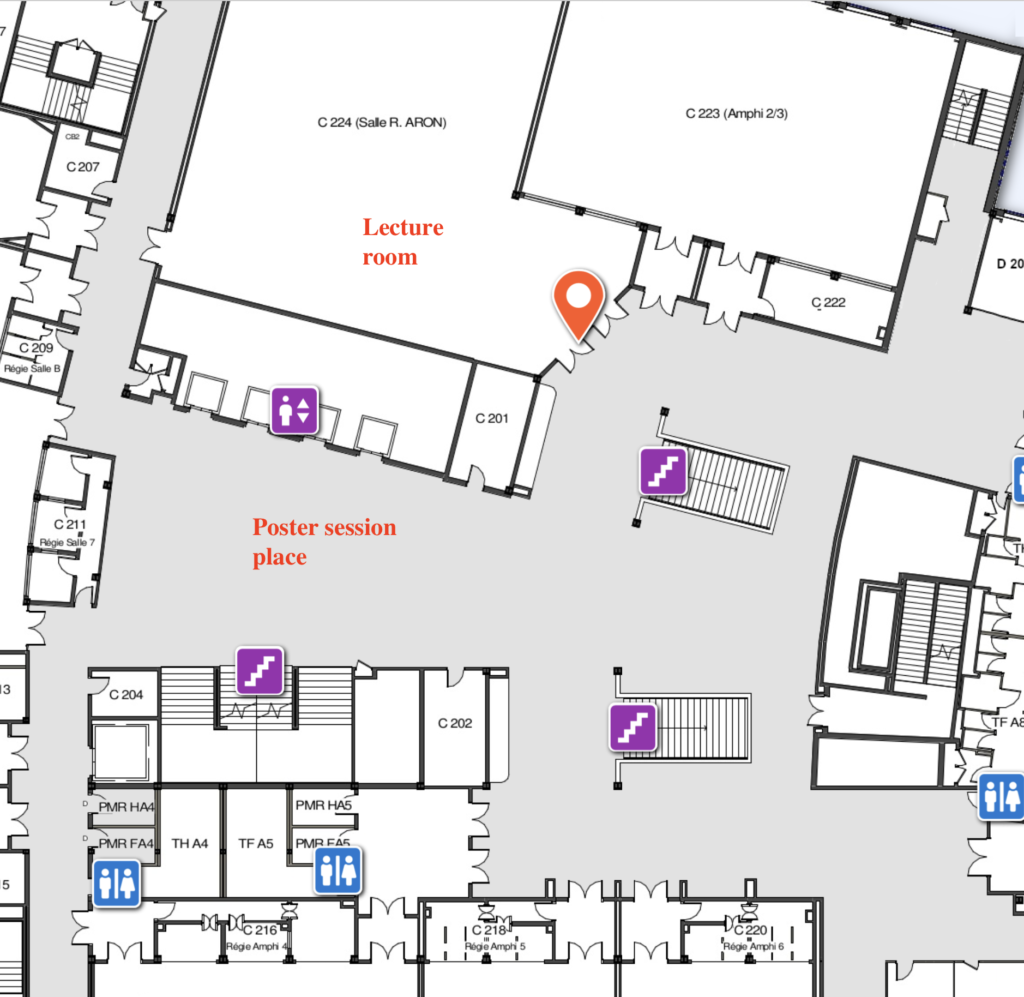
Institut Pasteur
The symposium will be held face-to-face only (no recording or remote access). This event is organized as part of a transversal initiative on AI (ATC-AI). The goal is to inspire more research at the intersections of AI and biology or medicine and foster new collaborations.
We will have a dozen talks on applications of AI to omics, structural biology, imaging and more.
The symposium will include four keynote talks by eminent speakers:
Anna Kreshuk (EMBL, Heidelberg, Germany)
Maria Rodriguez Martinez (IBM, Zurich Research Laboratory, Zurich, Switzerland)
Fabian Theis (Helmholtz Zentrum München, Munich, Germany)
Jean- Philippe Vert (Owkin, Paris, France)
The meeting will start on July 3rd around 2 PM and end on July 4th around noon.
We now welcome registrations (free but mandatory) and applications for posters: Link
without registration, you will not be able to access the Institut Pasteur Campus !
Please note that the registration deadline is June 15th.
ENSEEIHT, 2 rue Camichel à Toulouse (amphithéâtre A002).
Cet événement, dont la mission est de stimuler les collaborations et interactions entre les deux instituts 3IA de Toulouse et Paris est ouvert principalement aux membres des deux instituts mais aussi aux chercheurs et doctorants intéressés par les thématiques autour de l’intelligence artificielle et de l’optimisation (au sens large).
Inscriptions et programme ici
Future4care, Watt-Biopark, 8 Rue Jean Antoine de Baïf, 75013 Paris
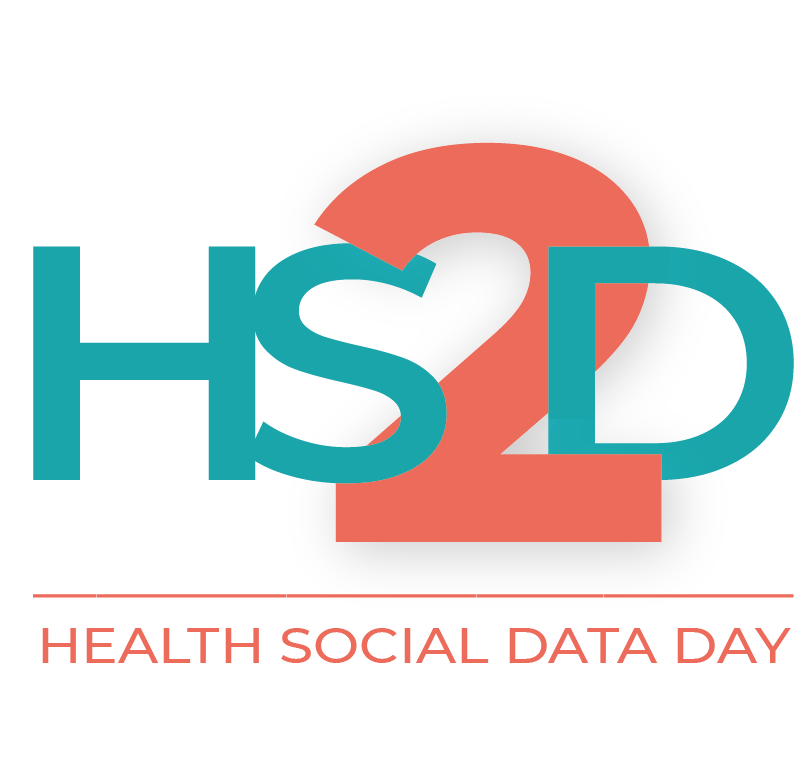
The Health Social Data Day is an event dedicated to health data from social networks organized by Kap Code and TechToMed.
The number of Internet users is constantly increasing. On social networks, many users spontaneously talk about their health. These testimonies constitute a new source of health data.
The Health Social Data Day aims to discuss the use and challenges of health data from social networks in terms of public health in order to raise awareness among health actors about the value of this innovative approach.
More info and registration – here
PariSanté Campus and online

The Interdisciplinary Institutes for Artificial Intelligence (3IA), MIAI (Grenoble), 3IA Côte d’Azur (Nice) and PR[AI]RIE (Paris), in collaboration with the Health Data Hub, are pleased to announce the third edition of the Summer School AI4Health.
This Summer School will cover the latest advances in the field of AI and data science applied to health. It will start with three days of plenary sessions with lectures and use cases, led by international speakers, accessible onsite and online. They will be followed by two days of handson practical sessions, led by experts, for the onsite participants only. All speakers will be onsite in Paris.
The school will be held in English and is aimed at students (masters from the first year, PhD), post-docs, academics, members of public institutions, and professionals. Please note that in order to participate in the practical sessions, basic knowledge in machine learning (python or others) is required.
Registrations opening in april 2023, to stay informed, pre-register here.
Salle Raymond Aron, Université Paris Dauphine-PSL, Place du Maréchal de Lattre de Tassigny, 75016 Paris
Inscriptions closes / Registration closed
This is a physical workshop, no streaming is planned for this event.
![PR[AI]RIE workshop](https://prairie-institute.fr/wp-content/uploads/2021/11/Bandeau-Paris-AI-Week-FTGP-1024x176.png)
Jean Ponce and Isabelle Ryl
09:00-09:20 Francis Bach (Inria, PRAIRIE), “Kernel sums of squares for optimization and beyond”
09:20-09:40 Aymeric Dieuleveut (Ecole Polytechnique, Hi! Paris), “Federated Learning with compression”
09:40-10:00 Gabriel Peyré (ENS-PSL, PRAIRIE), “Scaling optimal transport for high-dimensional Learning”
10:00-10:20 Edouard Oyallon (CNRS, SCAI), “Learning is boring: image classification with patches”
10:20-10:40 Rachel Bawden (Inria, PRAIRIE), “Handling Variation in Text with Machine Translation”
10:40-11:00 Coffee break
11:00-11:20 Thierry Poibeau (CNRS & ENS-PSL), “Poetry generation, around Oupoco”
11:20-11:40 Martial Hebert (Carnegie-Mellon University), “Robust AI”
11:40-12:00 Justin Carpentier (Inria, PRAIRIE), “Robotics – What should be really learned?”
12:00-12:20 Raphaël Porcher (Université de Paris, PRAIRIE), “Stochastic implementation of individualized treatment rules”
12:20-12:40 Nicholas Ayache (Inria, 3IA Côte-d’Azur, “AI for medical imaging – The role of models”
12:40-14:10 Lunch and posters
14:10-14:30 Alexandre Gramfort (Inria, DATAIA), “Bridging the gap between neurosciences and machine learning”
14:30-14:50 Laura Cantini (CNRS, IBENS-ENS-PSL, PRAIRIE), “Single-cell multi-modal data integration”
14:50-15:10 Jean-Baptiste Masson (Institut Pasteur, PRAIRIE), “Physics-informed Bayesian learning: from random walks to fetus morphology”
15:10-15:30 Umut Simsekli (Inria, PRAIRIE), “Towards building a heavy-tailed theory of stochastic gradient descent for deep neural networks”
15:30-15:50 Julien Mairal (Inria, MIAI), “Lucas-Kanade reloaded: End-to-end super-resolution from raw image bursts”
15:50-16:10 Coffee break
16:10-16:30 Cordelia Schmid (Inria, PRAIRIE), “Do you see what I see? Large-scale learning from multimodal videos”
16:30-16:50 Jérôme Lang (Dauphine-PSL, PRAIRIE), “AI for collective decision making”
16:50-17:10 Jérôme Bolte (TSE School of Economics, ANITI), “Conservative calculus: a variational calculus for nonsmooth algorithmic differentiation”
17:10-17:30 Clément Royer (Dauphine-PSL, PRAIRIE), “Black-box optimization based on probabilistic properties”
This event will take place at Sorbonne Center on Artificial Intelligence (SCAI) on the Jussieu campus (Paris 5ème).
l’Académie des sciences, la Grande salle des séances de l’Institut de France
https://www.academie-sciences.fr/pdf/conf/22_04_12_homme_repare.pdf
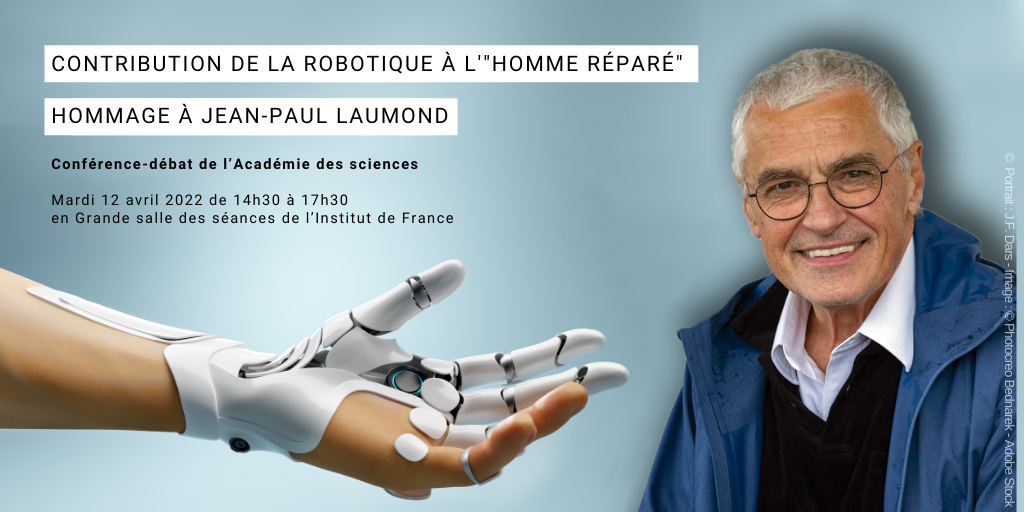
Les inscriptions sont ouvertes au public dans la limite des places disponibles : https://www.academie-sciences.fr/fr/Colloques-conferences-et-debats/robotique-homme-repare-hommage-jean-paul-laumond.html
PariSanté Campus, PSL University
Speakers: Arturo Baldo (Scikit Learn), Felix Fritzen (Stuttgart U.), Elie Hachem (Mines Paris), Matthieu Labeau (Télécom Paris), Ivan Laptev (INRIA), David Ryckelynck (Mines Paris), Kathrin Smetana (Twente U.)
Registration (limit of 20 participants)
CNIA se déroulera cette année à Saint-Etienne dans le cadre de la Plate-Forme Intelligence Artificielle (PFIA).
Pour toute information complémentaire, n’hésitez pas à consulter le site https://ci.mines-stetienne.fr/pfia2022/conferences/cnia/
La Conférence Nationale en Intelligence Artificielle (CNIA), soutenue par le Conseil d’Administration de l’AFIA, s’adresse à l’ensemble de la communauté de recherche en IA. CNIA se veut un lieu privilégié pour faire connaître les dernières avancées en IA. Elle se veut aussi un forum destiné à renforcer les liens et les interactions entre les différentes sous-disciplines de l’IA et les disciplines faisant appel à l’IA. À ce tire, CNIA encourage les soumissions à la frontière entre sous-branches de l’IA, ainsi que les soumissions à la frontière de l’IA et d’autres disciplines.
Alors que l’IA se trouve aujourd’hui au cœur de nombreux développements, il est important d’avoir un forum qui réunisse l’ensemble des acteurs intéressés de près ou de loin par l’IA. L’objectif de CNIA est d’aborder à la fois les problématiques de recherche, les enjeux technologiques et les enjeux sociétaux liés à l’utilisation de l’IA, à travers l’ensemble des disciplines de l’IA :
CNIA invite également :
Dates importantes: